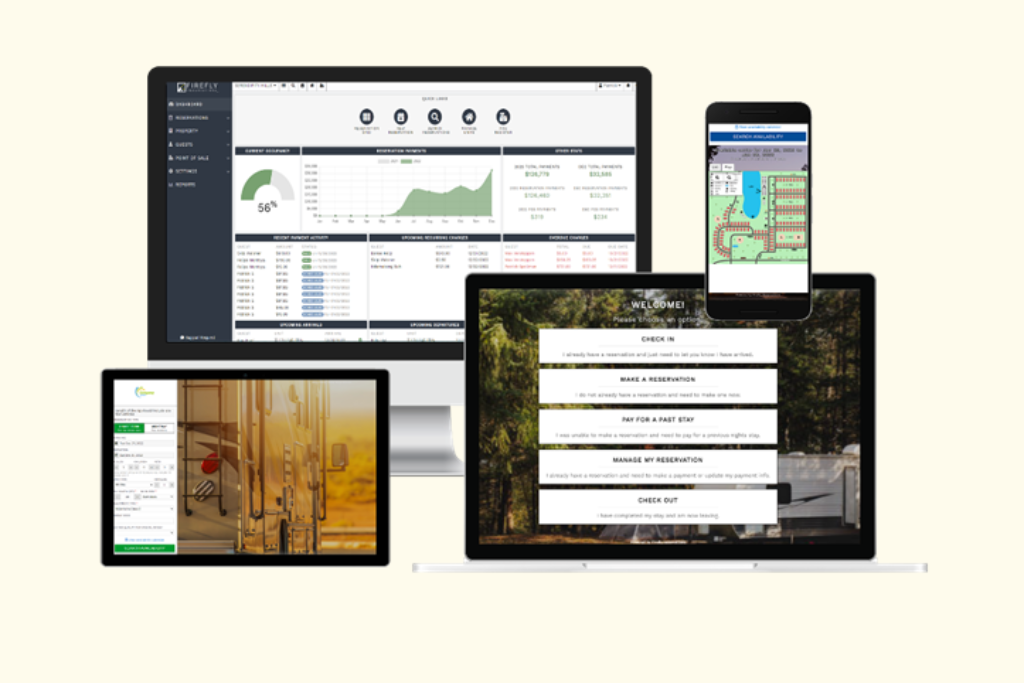With summer right around the corner, it’s time to make sure your campground staff is prepared for busy season crowds. Giving your staff the training and knowledge they need to go above and beyond for your guests is well worth the time and will help make your job easier down the road.
Here are five key areas where you can help your staff feel confident heading into summer.
- Directions to the Campground
This may seem obvious, especially if you’ve owned your campground for a while and know the surrounding areas like the back of your hand. But for seasonal staff or staff from out of town, clearly communicating directions over the phone to guests may be difficult when put on the spot.
If possible, take your staff out and drive them on the route or routes that most of your guests will be taking to your campground. Let them get a feel for the route and familiarize themselves with key highways, exits, landmarks, and street names. For staff who are not accustomed to driving an RV or travel trailer, you can also point out any tight turns or low clearances. This will help them describe spots of consideration for big rig RV owners when giving directions over the phone.
- Commonly Asked Questions
Over time, you’ve probably learned what questions guests will typically ask upon their check-in and during their stay at your campground. These could range from questions about on-site amenities like the WiFi password or dump station location, inquiries about campground policies like quiet hours, or the distance to the nearest grocery store or mechanic.
If you don’t already have answers to these common questions compiled in a handbook or FAQ sheet, create a document where your staff can review the answers to commonly asked questions. Give your staff time to review this information and get familiar with your campground layout, amenities, and policies. Your staff may not have the answer to every single question, but making sure they’re solid on the basics will help keep your campground policies and guest expectations consistent across all fronts.
- Local Attractions
Many campground guests are looking for unique or memorable experiences during their stay. Having a staff who are familiar with local attractions and who are excited to share that information is a great way to set your campground apart.
If possible, give your staff the chance to check out some of the nearby attractions for themselves. Take a staff “field trip” to nearby state parks, local restaurants or shops, historical sites, or other popular attractions. This hands-on experience will help your staff confidently describe attractions to guests and determine which suggestions might be more relevant for families with young children, older couples, etc.
If you’re not able to take your staff to local attractions in person, you can still put together a list of the most popular spots with detailed descriptions that your staff can keep on hand.
- Communcation Across Staff
When it comes to running your campground smoothly, clear communication between your staff is just as important as communication with the guests. Make sure the different departments of your staff—front desk, maintenance, housekeeping, etc.—know who to contact for what issues and the best way to contact them.
If you don’t already have one, create a staff directory that’s easily accessible for all of your employees. You could also host regular staff outings or team-building events to help foster a collaborative environment and sold work relationships. Training your staff to maintain open communication and bring campground issues to the right people will help ensure those issues are addressed promptly.
- Regular Check-Ins
It may feel like just one more thing to add to your already-full plate, but checking in regularly with your staff is a great way to build trust and foster a positive work environment. These check-ins can be as structured or informal as you like—from weekly group meetings to quick one-on-one conversations. Figure out what works best for you and your staff and keep it consistent.
Take this time to address questions, concerns, and goals with your staff. Working a customer-facing job will always come with some stress and frustration. Taking the time to listen to your staff can help them feel appreciated and give them a constructive outlet to voice frustrations, as opposed to taking them out on guests. A happier staff leads to happier guests—and ultimately to a happier campground owner.
Taking the time to get your staff comfortable in these basic areas is one of the key ingredients for a smooth busy season. These tips may look different depending on your campground’s size, amenities, and location—so be sure to adapt them to whatever works best for your operation.
If you’re looking for more ways to simplify your day-to-day tasks this summer, check out our campground management software with features that are designed to make your life easier.



